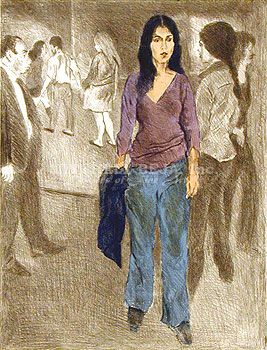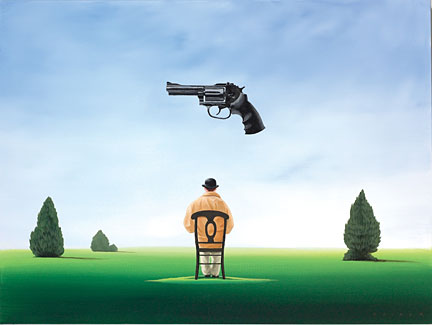
Raphael Soyer Limited Edition Lithograph on Paper:"Passing By"

Artist:Raphael Soyer
Title:Passing By
Image Size:20"x15"
Paper Size:28"x21¾"
Edition:Artist Hand Signed and Numbered Limited Edition to 300
Medium:Lithograph on Paper
About the Artist:Regarded as America's leading advocate of realism, Raphael Soyer devoted his long, productive life to "painting people ... in their natural context-who belong to their time." During the 1930s, Soyer's poignant portrayals of New York City's office workers and the unemployed secured his reputation as a major Social Realist. The painting My Friends reflects the shift in Soyer's work of the 1940s from urban environments towards interior scenes. In this work, he has combined two common themes of his oeuvre: intimate studies of solitary women, often nudes, and portraits of fellow artists, reflecting his great affection and admiration for them. In 1941 his show, My Contemporaries and Elders, featured portraits of Raphael himself, his twin Moses Soyer, Chaim Gross, and David Burliuk. All four artists, along with Nicolai Cikovsky, later appeared in My Friends, one of Soyer's largest paintings. Represented in Soyer's studio, from left to right, are Cynthia Brown, Cikovsky, Moses, Burliuk, and the figurative sculptor Gross. In the background, Raphael is seated at his easel, painting an unidentified nude model. A scroll in the foreground proclaims, "Friendship is the wine of life." Among Soyer's closest friends were the painters Cikovsky and Burliuk, who shared his Russian heritage. Soyer's favorite artist-model was the pioneering cubo-futurist Burliuk, who is seated in the center of My Friends. Since 1917, Soyer's most frequent model was himself, often with pencil or brush in hand. "I always paint myself appearing introverted.... I never make myself entirely like myself. I always appear older looking, or unshaven, or all alone. It's the result of looking a little bit more deeply." Like Soyer, his friends are, in his works, portrayed as introspective, "dissociated from one another even when they're painted together." He felt that this interpretation derived not only from looking at the world from his perspective but also as a result of New York City's "certain coldness and hardness and dissociation," which compelled him "to dig, to scrape, to unearth the beauty." Soyer appreciated this combination of aloofness and penetration in the work of Edgar Degas, which he regarded as a reflection of the artist's personality and profound psychological modernity. Soyer was "fascinated by the art of Degas-worldly, analytical, refined." The casual cropping of the nude model behind the space-dividing screen recalls Soyer's appreciation of Degas's compositional devices. Likewise, the subtle color scheme, the disassociation of carefully arranged, introverted figures, and the sense of the honest, unguarded moment in My Friends all suggest Soyer's admiration of such Degas group compositions as The Belleli Family (1858-67, Musee d'Orsay, Paris) and Portraits in an Office (New Orleans) (1873, Musee des Beaux-Arts, Pau). My Friends pays homage to the venerable tradition of group portraiture. According to Soyer, "the two greatest portrait groups ever painted" were Rembrandt van Rijds The Syndics (1661, Rijksmuseum, Amsterdam) and Diego Velazquezs Las Mefiinas (1656, Nacional Museo del Prado). Velazquez's masterpiece reminded him of another work with the artist at his easel, Gustave Courbet's The Painter's Studio (1855, Mus6e d'Orsay, Paris). Soyer admired Courbet's "eloquent ... restrained color harmony" and "complete absence of melodrama." My Friends was featured in the major exhibition, Painting in the United States 1948, and in a solo show, both at the Carnegie Institute, Pittsburgh, that year. Reviewing this exhibition, Robert M. Coates praised Soyer's "design [which] in such pieces as the large studio group called My Friends ... has become at once sounder and bolder."
Description: All Prints are sale priced everyday! Professionally Frame any print from our dealer gallery starting at an additional $149 and receive free shipping!
Click here to view the framing options.
Title:Passing By
Image Size:20"x15"
Paper Size:28"x21¾"
Edition:Artist Hand Signed and Numbered Limited Edition to 300
Medium:Lithograph on Paper
About the Artist:Regarded as America's leading advocate of realism, Raphael Soyer devoted his long, productive life to "painting people ... in their natural context-who belong to their time." During the 1930s, Soyer's poignant portrayals of New York City's office workers and the unemployed secured his reputation as a major Social Realist. The painting My Friends reflects the shift in Soyer's work of the 1940s from urban environments towards interior scenes. In this work, he has combined two common themes of his oeuvre: intimate studies of solitary women, often nudes, and portraits of fellow artists, reflecting his great affection and admiration for them. In 1941 his show, My Contemporaries and Elders, featured portraits of Raphael himself, his twin Moses Soyer, Chaim Gross, and David Burliuk. All four artists, along with Nicolai Cikovsky, later appeared in My Friends, one of Soyer's largest paintings. Represented in Soyer's studio, from left to right, are Cynthia Brown, Cikovsky, Moses, Burliuk, and the figurative sculptor Gross. In the background, Raphael is seated at his easel, painting an unidentified nude model. A scroll in the foreground proclaims, "Friendship is the wine of life." Among Soyer's closest friends were the painters Cikovsky and Burliuk, who shared his Russian heritage. Soyer's favorite artist-model was the pioneering cubo-futurist Burliuk, who is seated in the center of My Friends. Since 1917, Soyer's most frequent model was himself, often with pencil or brush in hand. "I always paint myself appearing introverted.... I never make myself entirely like myself. I always appear older looking, or unshaven, or all alone. It's the result of looking a little bit more deeply." Like Soyer, his friends are, in his works, portrayed as introspective, "dissociated from one another even when they're painted together." He felt that this interpretation derived not only from looking at the world from his perspective but also as a result of New York City's "certain coldness and hardness and dissociation," which compelled him "to dig, to scrape, to unearth the beauty." Soyer appreciated this combination of aloofness and penetration in the work of Edgar Degas, which he regarded as a reflection of the artist's personality and profound psychological modernity. Soyer was "fascinated by the art of Degas-worldly, analytical, refined." The casual cropping of the nude model behind the space-dividing screen recalls Soyer's appreciation of Degas's compositional devices. Likewise, the subtle color scheme, the disassociation of carefully arranged, introverted figures, and the sense of the honest, unguarded moment in My Friends all suggest Soyer's admiration of such Degas group compositions as The Belleli Family (1858-67, Musee d'Orsay, Paris) and Portraits in an Office (New Orleans) (1873, Musee des Beaux-Arts, Pau). My Friends pays homage to the venerable tradition of group portraiture. According to Soyer, "the two greatest portrait groups ever painted" were Rembrandt van Rijds The Syndics (1661, Rijksmuseum, Amsterdam) and Diego Velazquezs Las Mefiinas (1656, Nacional Museo del Prado). Velazquez's masterpiece reminded him of another work with the artist at his easel, Gustave Courbet's The Painter's Studio (1855, Mus6e d'Orsay, Paris). Soyer admired Courbet's "eloquent ... restrained color harmony" and "complete absence of melodrama." My Friends was featured in the major exhibition, Painting in the United States 1948, and in a solo show, both at the Carnegie Institute, Pittsburgh, that year. Reviewing this exhibition, Robert M. Coates praised Soyer's "design [which] in such pieces as the large studio group called My Friends ... has become at once sounder and bolder."
Description: All Prints are sale priced everyday! Professionally Frame any print from our dealer gallery starting at an additional $149 and receive free shipping!
Click here to view the framing options.
Availability: Print only orders usually ship in 3-9 days. "Custom Framed" products are made to order by craftsman, so additional time is required. Please allow 3-4 weeks for delivery.














